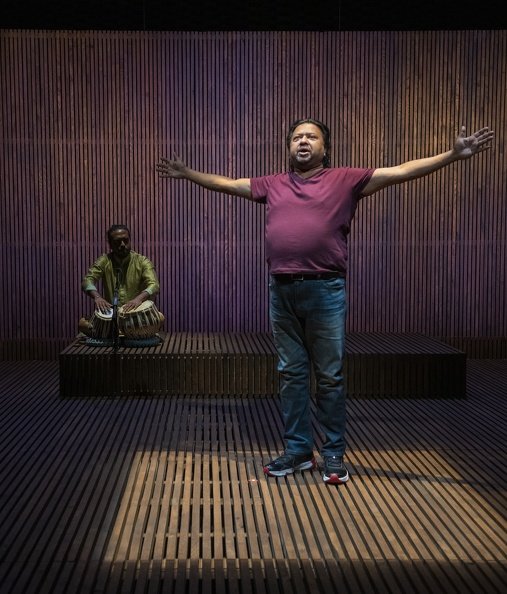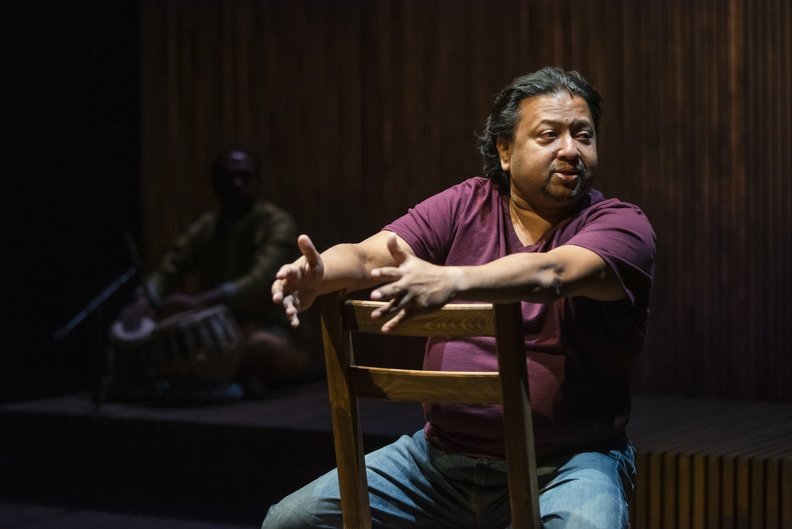Review of Dishwasher Dreams, Hartford Stage
What do stand-up comics do when they’re off the circuit? Some become Hollywood movie stars or join seasons of sitcoms on one platform or another. But what about the minority comic whose ethnicity, in white-dominated popular culture, seems to suit him only for bad guys or guys whose comic range is to be a walking cliché? Maybe they create a theatrical monologue that lets them tell their story while entertaining audiences with a view of Show Biz a bit more multicultural than the norm.
In Dishwasher Dreams, now playing at Hartford Stage through March 20, Alaudin Ullah (aka, Aladdin) tells us about his family, his childhood, his career. It’s not so much a story of slings and arrows—though there are slurs and sorrows—as it is a fond journey with moments of grief and glee along the way, much as anyone’s life is. The difference is in the details, but that too is part of what makes America American: immigrant stories—no matter the immigrants’ origins—play out in the pop culture grab-bag that we all live in and with. As a second-generation son of South Asian immigrants living in Spanish Harlem, Ullah has a beguiling grasp of street energies and the kind of “melting pot” mix that spices many an urban environment. But he’s also an entertainer who rose up through the ranks in comedy clubs—beginning with Don’t Tell Mamas, with a largely gay and drag clientele—and onto cable programs on Comedy Central (Ullah’s reminiscence about cable TV coming to the projects will strike a chord with anyone who remembers TV before and after cable). So he’s also uniquely poised to tell us something about America and what it means to find a niche in which to be successfully entertaining.
Alaudin Ullah, foreground, and Avirodh Sharma in Dishwasher Dreams, Hartford Stage; photo by Michael Brosilow
Ullah’s manner finds humor in most situations, such as the identity issues that come with being Muslim in the U.S. As a faith that is sometimes mistaken for an ethnicity, Ullah can insist he’s “about as Muslim as Pee Wee Herman,” but that doesn’t mean he won’t be asked to “do a Muslim accent.” His family are Bengalis, from the part of India that won independence and became Bangladesh when Ullah was not yet a teen. Important to the story is how Ullah characterizes his background, such as how his father chose to leave his village because of a belief in America as a land of opportunity where a job as a dishwasher and a mice and roach-ridden apartment in Spanish Harlem equal a dream come true. So when Ullah finds himself living rough while trying to break into Show Biz, he’s got a model to follow.
Ullah’s acculturation lets him mock such staples as the familiar glitzy dance moments—in place of depicting sex—in the Bollywood films his family goes on outings to see, and to find great admiration in the stark beauty of Satyajit Ray’s Apu films, which happen to be set near the village Alaudin’s father emigrated from. Moments of name-checking Indian culture are more than matched by young Alaudin’s greatest U.S. enthusiasm: The New York Yankees. The scenes depicting—early and late—Ullah’s part in the collective euphoria surrounding Reggie Jackson are highpoints as the comedian is able to channel his inner twelve-year-old and lights up the stage with his love.
Tenser matters are provided by the comedian’s mother’s illness and darker themes emerge from a family visit to Bangladesh where Ullah encounters a cousin whose fate weighs heavily. At such moments the aural presence of Avirodh Sharma, playing hand-drums on stage throughout the show, is greatly effective, punctuating Ullah’s monologue and creating atmosphere, a language of percussion that supports and comments.
Avirodh Sharma in Dishwasher Dreams, Hartford Stage; photo by Michael Brosilow
And that’s to the good because Alaudin Ullah’s monologue can at times feel rather static. Director Chay Yew has Ullah move about the stage to signal changes in locale and mood, and Ullah sometimes stands on a chair or crouches to give variety to his presence, all of which, including the tasteful lighting by Anshuman Bhatia and the handsome wooden stage by Yu Shibagaki, helps to keep us focused and responsive. But if you’re used to comedians who flaunt fluid movements in the midst of fast-paced commentary and asides, you might find Ullah’s routine to be a bit over-rehearsed and even a bit too earnest.
Alaudin Ullah in Dishwasher Dreams, Hartford Stage; photo by Michael Brosilow
Ullah wisely keeps to the end his most comic bit, where he gooses the stereotypical image of the Southern Asian immigrant while at the same time wryly asserting the special privileges that come with assimilation via Show Biz. It works, because Ullah is willing to see that the laugh is on him as well.
Dishwasher Dreams
Written & performed by Alaudin Ullah
Directed by Chay Yew
Music by Avirodh Sharma
Scenic Design: Yu Shibagaki; Costume Design: Izumi Imaba; Lighting Design: Anshuman Bhatia; Composer/Arranger: Avirodh Sharma; Assistant Director: Christopher Rowe; Assistant Lighting Design: Daniel Friedman; Production Stage Manager: David Castellanos; Assistant Stage Manager: Theresa Stark; Artistic Producer: Rachel Alderman; Director of Production: Bryan T. Holcombe; General Manager: Emily Van Scot
Hartford Stage
February 24-March 20, 2022


